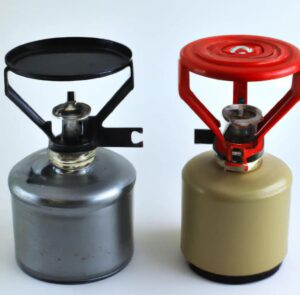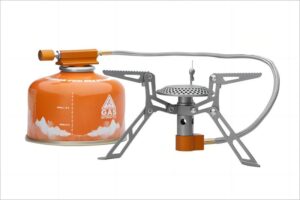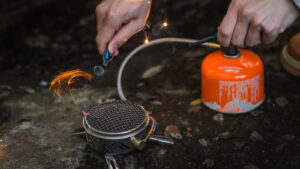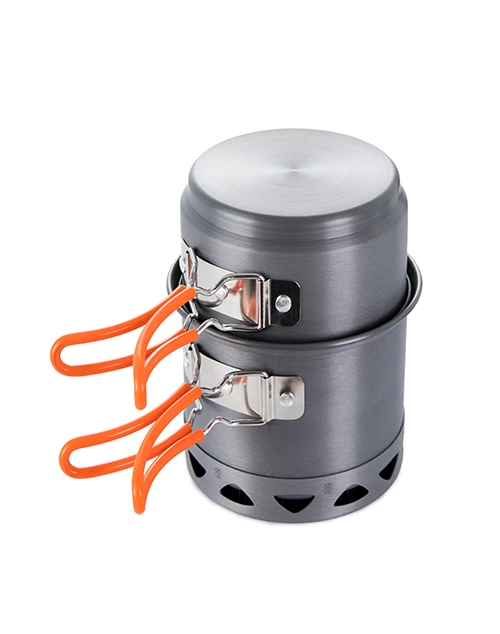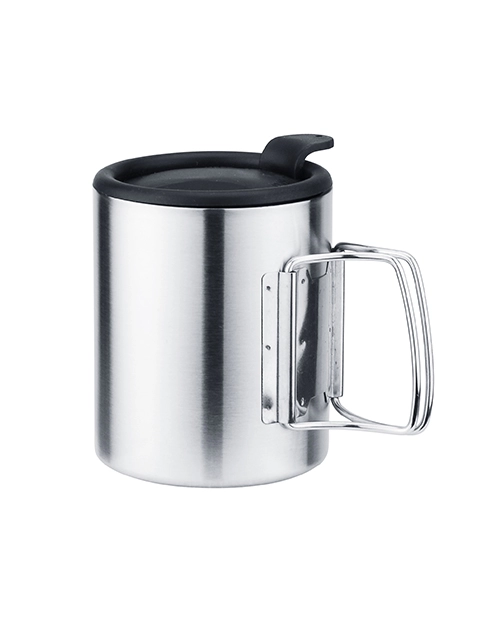
Hikers and backpackers use alcohol stoves because they are lightweight, affordable, and simple to operate. Canister stoves, on the other hand, provide more precise temperature control and speedier boiling time. They are more effective in cold weather situations. So, which stove wins the massive outdoor cooking competition? Join us as we dig into the alcohol stove vs. canister stove and help you determine whether the stove is the best choice for your next camping trip.
What is a Canister Stove?
Canister stoves are a form of camping stove that is lightweight and portable, making them popular among backpackers, hikers, and campers who need to prepare meals in the outdoors.
The stove’s burner head fits to the top of a pressurized fuel canister. The canister supplies the stove’s fuel, a blend of propane and butane gas. The burner is usually composed of metal and has small holes or jets that enable fuel to escape and ignite when lighted with a match or lighter.
Advantages Of Using a Canister Stove:
- Canister stoves are lightweight and small, making them easy to pack and bring on trekking or camping trips.
- They are easy to set up and utilize. The fuel canister screws onto the stove and ignites it with a spark.
- Canister stoves use relatively little fuel and can swiftly boil water and cook food.
- Canister stoves are deemed safe since the compressed fuel canister is intended to be sturdy and secure.
- They require little maintenance and can last for many years with appropriate care.
The disadvantages of using a canister stove:
- Canister stoves rely on pre-packaged fuel canisters, which can be expensive and difficult to get in isolated regions.
- Canister stoves are difficult to manage in terms of flame and temperature, making it harder to prepare more complex dishes.
- They are sensitive to cold temperatures and may not perform effectively in severe weather situations.
- If used gasoline canisters are not recycled properly, they might contribute to environmental damage.
- Canister stoves have a limited fuel capacity, thus bigger parties may need to pack numerous fuel canisters, adding weight and size to their burden.
Types Of Fuels That Can Be Used In A Canister Stove
Canister stoves generally operate on propane and butane gas stored in a pressurized canister. However, several canister stoves may be converted to burn different types of fuel, such as:
1.Isobutane:
Isobutane, like butane, is a clean-burning fuel suited for cold weather.
2.Propane:
Propane is a common fuel used in outdoor barbecues and may also be used in canister stoves.
3.White Gas:
White gas, often known as Coleman fuel, is a common liquid fuel for stoves. Some canister burners may be converted to use white gas with an extra adapter.
What is an Alcohol Stove?
An alcohol stove is a portable stove that runs on denatured or other forms of alcohol. Alcohol stoves are popular among hikers, campers, and backpackers because to their lightweight, small size, and ease of use.
Alcohol stoves typically have a metal or plastic base, a burner assembly, and a fuel reservoir. The fuel reservoir is usually filled with denatured alcohol, a form of alcohol that has been processed to render it unfit for human consumption. When the stove is lighted, the alcohol heats and vaporizes, igniting and generating a flame.
Advantages And Disadvantages of Using an Alcohol Stove
Advantages Of Using an Alcohol Stove:
- Alcohol stoves are lightweight and small, making them convenient to carry and bring on outdoor vacations.
- These stoves are simple to ignite and regulate, with no need for priming or pumping.
- They emit no soot or smoke, making them environmentally friendly and easy to clean up after use.
- Denatured alcohol, which is used in alcohol stoves, is generally accessible and can be purchased at most hardware, outdoor, and grocery stores.
- Denatured alcohol is inexpensive, making alcohol stoves an affordable choice for outdoor cooking.
Disadvantages of using an alcohol stove:
- Alcohol stoves often cook at a slower rate than other stoves, such as propane.
- Alcohol stoves have a limited heat output, making them unsuitable for cooking in harsh weather conditions or with big numbers of people.
- They are sensitive to wind, which affects their effectiveness and necessitates the use of a windshield to protect the flame.
- Alcohol is a flammable substance; therefore, alcohol stoves may cause fires if not utilized and maintained properly.
- Alcohol stoves are less exact than other stoves, making it difficult to effectively manage cooking temperatures.
Types Of Fuels That Can Be Used In An Alcohol Stove
Denatured alcohol is the most frequent fuel for alcohol stoves. Other fuels that may be utilized in alcohol stoves include:
1) Ethanol
Ethanol is an alcohol that may be used to fuel alcohol stoves. It burns cleanly with no hazardous fumes.
- Methanol.
Methanol is another form of alcohol that may be burned as fuel in alcohol stoves. It burns hotter and cleaner than denatured alcohol, but is more costly and difficult to get.
- Isopropyl alcohol.
Alcohol stoves may run on isopropyl alcohol, sometimes known as rubbing alcohol. However, it burns less cleanly than other forms of alcohol and emits more soot.
- Methylated spirits.
Methylated spirits, or denatured alcohol, are the most often utilized fuel for alcohol stoves. It is inappropriate for drinking since it contains ethyl alcohol and other substances.
Comparison between Alcohol Stoves vs Canister Stoves
Alcohol and canister stoves are popular camping stoves with distinct features that influence their suitability for various camping excursions.
- Weight.
Alcohol stoves are often lighter than canister stoves. Alcohol stoves are lightweight and do not require hefty fuel canisters, making them ideal for hiking or other activities where weight is a consideration.
- Fuel efficiency
Canister stoves are often more fuel efficient than alcohol stoves. Canister stoves have a pressurized fuel system, which allows for more efficient fuel consumption, resulting in longer burn periods and fewer fuel refills. Alcohol stoves, on the other hand, have poorer fuel efficiency and require more frequent refilling, although they are more often accessible in isolated locations.
- The ease of use
Canister stoves are often easier to use than alcohol stoves. Canister stoves need minimum setup and are ready to use with the press of a button. Alcohol stoves take additional setup and the user must manually ignite the burner. Canister stoves also include adjustable flame control, which makes it easy to alter the heat output when cooking.
- Cost
Alcohol stoves are often more affordable than canister stoves. Alcohol stoves may be manufactured from materials like aluminum cans, making them a less expensive choice. Canister stoves, on the other hand, are more expensive since they require specific equipment and fuel canisters.
When deciding which stove is most suited for different camping trips, consider the camper’s specific needs.
Conclusion
Finally, there is no obvious winner in the discussion between alcohol stoves and canister stoves because each has advantages and disadvantages. Alcohol stoves are lightweight and simple to operate, making them an ideal choice for trekkers and hikers. In contrast, canister stoves are efficient and easy to put up, making them perfect for vehicle camping and outdoor cooking.
Finally, the decision between the two will be based on personal preferences, cooking requirements, and outdoor activities. So, whether you go with an alcohol stove or a canister stove, emphasize safety and correct use to guarantee a successful and happy outdoor cooking experience.

